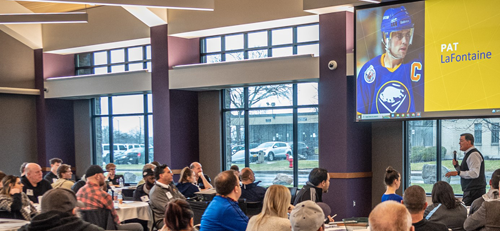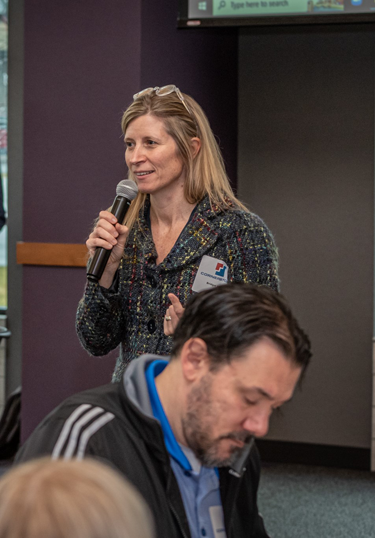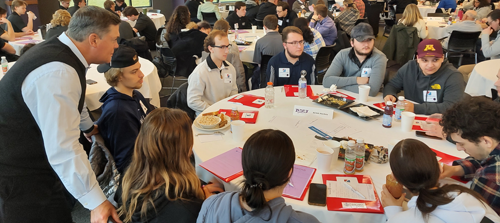Featured News - Current News - Archived News - News Categories
By Michael J. Billoni
Senior Contributing Writer
Pat LaFontaine grew up loving the game of hockey, as he played on backyard rinks in his hometown of Waterford, Michigan. As a teenager, his parents saw such tremendous potential in this future National Hockey League and United States Hockey Hall of Famer they allowed him to play junior hockey for Verdun in the Quebec Major Junior Hockey League in 1983. He was recognized that season as the Canadian Major Junior Player of the Year.
The next year, at 18, he embarked on what would prove to be an extremely successful NHL career on and off the ice, by signing with the New York Islanders, who traded up to select him with the third pick in the 1983 NHL Entry Draft. He played eight seasons with the Islanders before being traded to the Buffalo Sabres in 1991. There, he played six seasons before a concussion and brain injury impacted his career. He did go on to play one more season with the New York Rangers, giving him the unique hat trick of being one of five players in NHL history to skate for all three teams based in New York state, all part of a 15-year career that saw him total 1,013 points on 468 goals and 545 assists.
LaFontaine’s most memorable moment in hockey occurred in the 1987 Stanley Cup playoff finals when he scored the winning goal in the fourth overtime period of the seventh and decisive game between the Islanders and Washington Capitals, known as the “Easter Epic.” The game began on Saturday, April 18, and concluded just before 2 a.m. on Easter Sunday, the 19th.
During his illustrious career with the Sabres, he served as team captain from 1992-97. During the 1991-92 season, his play-making ability helped linemate Alexander Mogilny set a team record with 76 goals, while LaFontaine registered 95 assists and 148 points. Sadly, in a game against Pittsburgh early in the 1996-97 season, he was hammered by Francois Leroux with a high hit to the head, knocking him out with a concussion, resulting in a post-concussion syndrome.
Despite the Sabres’ front office reluctance to allow him to play, LaFontaine would practice on his own at a suburban rink where he rented ice time, vowing to play again, with team doctors advising against it. In a cost-saving move, the Sabres traded him to the Rangers on Sept. 29, 1997, and, during his one season with the Blue Shirts, he tied for the team lead in goals scored – and he recorded his 1,000th career NHL point. Late in the season, though, in a game against Ottawa, he accidentally collided with teammate Mike Keane and suffered another concussion, which kept him out the remainder of the season and the next season. This led to him to formally retire on Oct. 12, 1999.
LaFontaine, now 58, but looking as if he could put on his No. 16 jersey and still perform on the ice, was standing before a capacity crowd last Saturday morning in the Russell J. Salvatore Dining Commons on the Niagara University Campus to open the College of Hospitality, Sport, and Tourism Management’s annual Sports Summit.
Looking more like a corporate CEO with a blue, open-collar shirt, sleeveless sweater, blue slacks, shiny, polished shoes and a full head of black hair with no trace of gray, the passionate athlete and parent stood before an audience of youth sports leaders from Western New York and Southern Ontario, students, and members of NU’s Division 1 hockey team and its ACHA Club Hockey program and delivered the keynote address, “Re-Imagining Youth Sports.” He was joined by his business partner, Chris Price, of LIFE, in a program moderated by Dr. Bridget Niland, Ph.D., J.D., dean of Niagara University’s College of Hospitality, Sport, and Tourism Management.
In July 2021, Niland, a brilliant entrepreneur, coach, administrator and scholar, was convinced by NU President the Rev. James J. Maher, C.M., to leave an exciting and rewarding position of leading Project Play Western New York – an initiative begun by the Ralph C. Wilson, Jr. Foundation – to become dean of these important majors. She introduced “Cornerstone” as the initiative behind this new youth sports venture.
LaFontaine began his comments by expressing his sincere love for the City of Buffalo, which he calls “a community bounded by values.”
“What I have always loved about Buffalo is its sense of community and how all of its sports connects everyone. I recall walking through a Wegmans on a Sunday afternoon when I was playing here, and they were playing the Bills game over the sound system,” he said with a smile. “The pulse of this community is about their sports team. Winning is great, and that is why I want to come back here and join the celebration when the Bills win the Super Bowl or the Sabres win the Stanley Cup. It will be memorable.”
With the audience hanging on his every word, LaFontaine took a deep breath and began to get serious about why he was there and why he and his partner have teamed with Niland to ensure Cornerstone becomes a reality with all sports organizations.
“I wish all the kids who play sports today play for the love of the game,” he said. “We are losing so many kids at age 13 in all sports, and that is not right. We want to retain kids in sports, because sports gives kids a great opportunity to fail in a safe environment, so they can get up and continue playing without anyone judging them.”
LaFontaine credits hockey for shaping his values in life that began at home, but were built through hockey. He is a huge advocate for sports helping an athlete build their life skills while developing character.

The audience at Saturday’s event featuring Pat LaFontaine. (Photo courtesy of Thomas J. Burns, Niagara University)
••••••••
‘Declaration of Principles’
After pointing out that just 1/5th of 1% of young players make it to the NHL, 2% play at the college level and 1% receive a full scholarship, he explained, “If you are a parent or a coach, what do you want? I want my child to be well rounded, successful and happy. The value sports gives us is right there, but we must change the conversation from ‘You must win’ and ‘You must get a college scholarship’ to finding a way each kid can be the best they can be. If we put all kids at the right age level and allow them to develop, physically and emotionally, we will never go wrong.”
LaFontaine talked about what he and Price helped facilitate over several years in hockey that resulted in the game’s “Declaration of Principles” on Sept. 17, 2017. LaFontaine, now a consultant to the NHL, convinced the league to bring together representatives from all levels of hockey from youth to junior to college to club to international to professional and, after meeting for twice a year for a few years, they created the “Declaration of Principles,” which LaFontaine believes could be used in any sport.
The principles state:
√ We believe hockey should be an enjoyable experience for all stakeholders – the organization, players, parents, siblings, coaches, referees, volunteers and rink operators, who all play a role in this effort. “You must embrace everyone at every level,” LaFontaine said.
√ We believe hockey’s greatest value is the role it plays in the development of character and life skills. “Losing is great – get the spotlight off the elite and look at the game in a new way,” he said.
√ We believe all hockey organizations, regardless of size or level of competition, bring value to players and their families in their ability to deliver a positive family experience. “ ‘All we can do as coaches and players is to inspire, influence, and create a positive environment,’ is what a first-grade teacher once told me,” LaFontaine said.
√ We believe physical activity is important for a healthy body, mind and spirit.
√ We believe there are significant benefits of youth participants in multiple sports.
√ We believe hockey programs should be age-appropriate for all players, accounting for every individual’s physical, emotional, cognitive development.
√ We believe in great value in all forms of hockey, both on and off the ice.
√ We believe all hockey programs should provide a safe, positive, inclusive environment by players, families and administrators.

Dr. Bridget Niland, Ph.D., J.D. (Photo courtesy of Thomas J. Burns, Niagara University)
••••••••
Planting a Cornerstone
“Cornerstone is a project that actually grew out of Project Play WNY and started by the Ralph C Wilson, Jr. Foundation,” Niland explained. “It was developed by a group of coaches from youth, college, high school, and even professional sports teams. The work began in 2018 with Project Play WNY and then it followed me to Niagara University in 2021 to be developed into a formal program, now known as Cornerstone. It includes in-person sessions, online learning, and a mobile app for messaging.”
She added: “Cornerstone remains in the early adopter phase as we are trying to meet with as many organizations from the various parts of WNY that serve diverse populations to get their feedback so we can be inclusive of all different perspectives and situations. We plan to continue in the early adopter phase throughout this spring, and we will use the summer to refine the program based on the feedback we've received from early adopters. We will start another season of Cornerstone in the fall with those revised materials.
“Cornerstone pushes back against the current behavior of what we are used to with sports,” Niland added. “Cornerstone is fun, safe, and delivers lifetime values.”
Saturday's session was the seventh Cornerstone presentation to various audiences.
Essentially, the premise behind Cornerstone is how sports leagues, coaches, parents and players look at sports today. It is changing the landscape of how sports was when many of the coaches and the players today grew up. Since 2019, Niland has included LaFontaine and Price in developing this exciting, and much-needed concept.
“When I was with Project Play WNY, we learned about Pat LaFontaine’s ‘Declaration of Principles’ for all of hockey, and that is when we began talking. It has been a natural fit,” she said.
Continued Support
“Pat has been a tremendous source of support and influence in the development of Cornerstone,” Niland added. “Clearly, his success as an athlete and later as a humanitarian captures both the 360 degrees of what parents hope sports will bring to their children's lives. Not only has Pat excelled as an athlete and reached the highest level of play, but he has also learned the important lifelong values that only sports can teach a child.”
LaFontaine commended Niland on what she and NU are doing with Cornerstone, and he committed his and Price’s support.
“We need better thinking when it comes to sports, and we need to be inspiring an entire community with these values,” he said.
Before departing, LaFontaine left the audience with his personal 3 Es:
√ Show up with energy.
√ Execute the game plan.
√ Earn it.
“The game still lives inside of me,” LaFontaine said as a smile crossed his faced before he made his way to the table with NU hockey players for an intense Q&A.
Niland said, “Given his generous spirit, Pat also made time to visit with those two groups of student athletes to share more specific guidance/advice for them as they navigate college hockey. He also inspired them to get involved in Cornerstone as mentors to younger athletes in the community.”
This event began the annual Sports Summit, which continued with a Pegula Sports & Entertainment sales and ticketing symposium, a “Niagara University Night at the Sabres” game and the SMA dinner basketball tournament.
For more information, visit https://bit.ly/NU_SportsSummit.

Pat LaFontaine speaks with members of Niagara University’s club hockey team. (Photo courtesy of Michael J. Billoni)





























